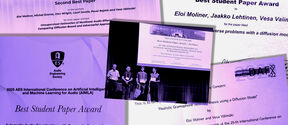Acknowledgement for research promoting explainable AI

Computer scientists from the University of Helsinki won the best paper award with their study entitled SLIPMAP: Fast and Robust Manifold Visualisation for Explainable AI (Björklund et al. 2024) at the IDA 2024 conference held in Stockholm in April.
The award-winning study describes a method that can be used to explain how complex machine learning and artificial intelligence methods work. The method makes it possible to understand how the machine learning methods make predictions for individual data points.
The SLIPMAP method creates a visualisation of the data as a non-linear projection, such that the machine learning method uses the same simple models for data points projected close to one another.
“We designed a machine learning algorithm, studied its computational properties and verified the behaviour by experimenting with the algorithm in various situations. We used publicly available datasets, open-source software, and the University’s high-performance computing environment,” says Doctoral Researcher Anton Björklund.
Use as a predictive model
The researchers have released the software under an open source license.
According to Professor Kai Puolamäki, the study improved a similar method previously developed by the researchers.
“The new method is considerably faster and works better with noisy data. It can also be used as a predictive machine learning model,” says Doctoral Researcher Lauri Seppäläinen.
The same methods are used by the Virtual Laboratory for Molecular Level Atmospheric Transformations (VILMA), a Centre of Excellence funded by the Research Council of Finland. Among other things, the methods are used to study atmospheric molecules.
The award-winning study is a continuation of Anton Björklund’s recently completed doctoral thesis entitled ‘Interpretable and explainable machine learning for natural sciences’, for which the Faculty has granted permission for public defence.
Publication:
Björklund, A., Seppäläinen, L., Puolamäki, K., 2024. SLIPMAP: Fast and Robust Manifold Visualisation for Explainable AI, in: Miliou, I., Piatkowski, N., Papapetrou, P. (Eds.), Advances in Intelligent Data Analysis XXII, Lecture Notes in Computer Science. Springer Nature Switzerland, Cham, pp. 223–235. https://doi.org/10.1007/978-3-031-58553-1_18
This news item was originally published on the University of Helsinki website on 10.05.2024
Read more news
A survey on users' experiences of Mykanta in collaboration between Aalto University and Kela
Senior university lecturer Sari Kujala's research group is exploring, in collaboration with Kela, users' experiences with the Mykanta online patient portal and the MyKanta mobile application.
Specialised AI models could be Finland's next global export
Finland has the potential to build AI solutions that are different from ChatGPT-like large language models. Aalto University's School of Electrical Engineering already has decades of experience in developing specialised, resource-efficient AI models. They could be a key component of future 6G networks, automation, and industrial systems – and the next competitive edge of our country.
Professor Patric Östergård becomes a member of the Finnish Society of Sciences and Letters
Finnish Society of Sciences and Letters is Finland's oldest science academy. It promotes scientific discussion, publishes scientific literature, awards prizes and provides financial support for research.